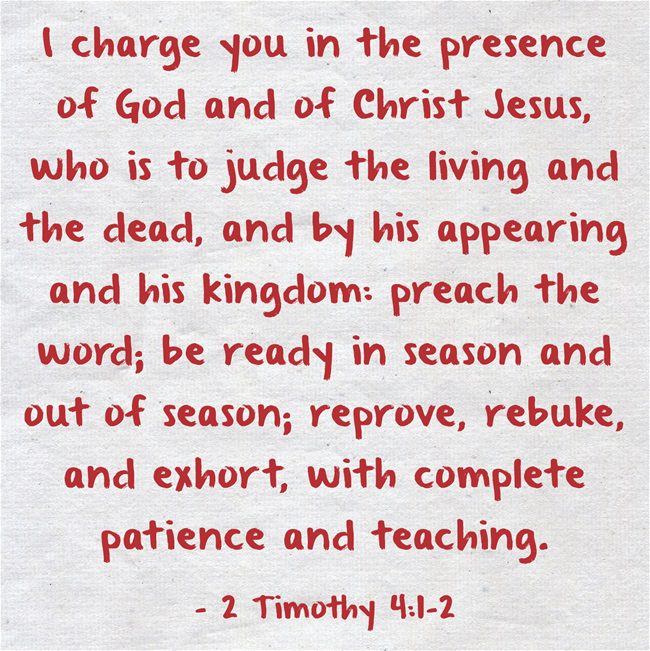Here is a Sunday school lesson or Bible study about responsibility.
Self-Responsibility
Galatians 6:4-5 “But let each one test his own work, and then his reason to boast will be in himself alone and not in his neighbor. For each will have to bear his own load.”
We are all told “work out your own salvation with fear and trembling” (Phil 2:12) because “it is God who works in you, both to will and to work for his good pleasure” (Phil 2:13). We are responsible for how we live our lives and time and again the Apostle Paul warns the church that “sexual immorality and all impurity or covetousness must not even be named among you, as is proper among saints. Let there be no filthiness nor foolish talk nor crude joking, which are out of place, but instead let there be thanksgiving. For you may be sure of this, that everyone who is sexually immoral or impure, or who is covetous (that is, an idolater), has no inheritance in the kingdom of Christ and God” (Eph 5:3-5) so “Let no one deceive you with empty words, for because of these things the wrath of God comes upon the sons of disobedience” (Eph 5:7) and by all means, “do not become partners with them” (Eph 5:7). There is no inheritance of the kingdom for those who continue in sin without repentance and faith.
How can we test our own work? What does that mean?
Does bearing our own load mean we ignore the load of others (Gal 6:2)?
How can we be deceived “with empty words?”
Accountability to God
Second Timothy 4:1-2 “I charge you in the presence of God and of Christ Jesus, who is to judge the living and the dead, and by his appearing and his kingdom: preach the word; be ready in season and out of season; reprove, rebuke, and exhort, with complete patience and teaching.”
This is similar to the instructions given to Titus where Paul told him to “Declare these things; exhort and rebuke with all authority [and] Let no one disregard you” (Titus 2:15). Paul had mentored Timothy for years and writes elsewhere to him to “devote yourself to the public reading of Scripture, to exhortation, to teaching” (1st Tim 4:13) clearly meaning the Holy Scriptures as Paul names it as a proper noun by capitalizing the word “Scripture.” By this time there were a few letters circulating from the apostles and some of the gospels had been written so that is what Timothy, and all pastors should be doing as Paul later writes, “preach the word; be ready in season and out of season; reprove, rebuke, and exhort, with complete patience and teaching” (2nd Tim 4:2) and this is very important because “the time is coming when people will not endure sound teaching, but having itching ears they will accumulate for themselves teachers to suit their own passions, and will turn away from listening to the truth and wander off into myths” (2nd Tim 4:3-4). That time has come.
What does it mean to have “itching ears?”
What does Paul mean by being “ready in season and out of season?”
Are church leaders commanded to rebuke, exhort, reprove, and correct sinning church members (Matt 18:15-19)?
Your Brother’s Keeper
Genesis 4:9 “Then the LORD said to Cain, “Where is Abel your brother?” He said, “I do not know; am I my brother’s keeper?”
This account took place shortly after Cain killed his brother Able and God has asked Cain where his brother was and his response has become well known, “am I my brother’s keeper?” Of course Cain knew where his brother was and so did God but God was asking Cain that he might confess it and repent of this but there is no record in the Bible that Cain ever did. This is just the opposite approach that the church should have as Jesus told the disciples, and by extension, He tells us “that you love one another: just as I have loved you, you also are to love one another” (John 13:34) meaning we are our brother and our sisters keepers. Jesus says, “This is my commandment, that you love one another as I have loved you” (John 15:12) and love does care enough to know where our brothers and sisters are in their lives.
Why did God ask Cain where his brother Able was?
Was Cain being sarcastic to God in Genesis 4:9?
Who is Jesus’ brother or sister (Mark 3:35)?
Conclusion
I urge you in your study to look at all of the Bible verses and read them aloud in the class so that you can get the most out of this lesson on responsibility and learn the Christian’s responsibility which is to know that “Love is patient and kind; love does not envy or boast; it is not arrogant or rude. It does not insist on its own way; it is not irritable or resentful; it does not rejoice at wrongdoing, but rejoices with the truth. Love bears all things, believes all things, hopes all things, endures all things” (1st Cor 13:4-7). That is my responsibility as a pastor and I believe it is the responsibility of every member that makes up the whole Body of Christ, the church.
Article by Jack Wellman
Jack Wellman is Pastor of the Mulvane Brethren Church in Mulvane Kansas. Jack is also the Senior Writer at What Christians Want To Know whose mission is to equip, encourage, and energize Christians and to address questions about the believer’s daily walk with God and the Bible. You can follow Jack on Google Plus or check out his book Teaching Children the Gospel available on Amazon.
















